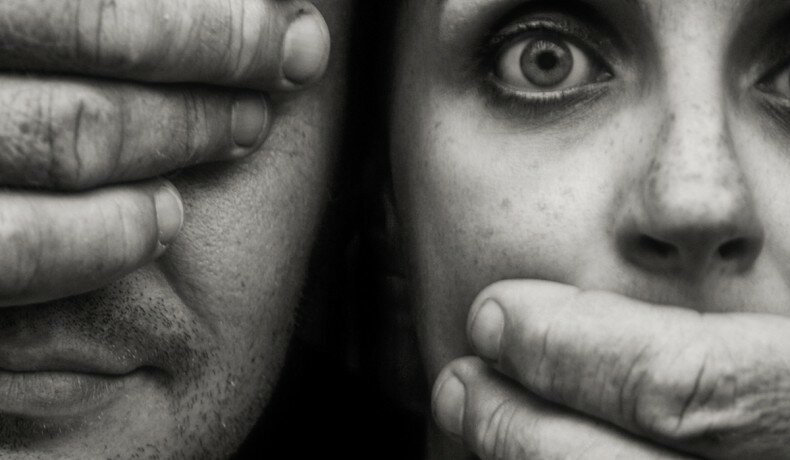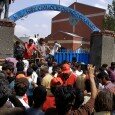By Yasir Habib Khan –
During last 6 years, merely 10 percent rapists were sentenced. All eyes set on when parliament passes Anti Rape Laws (Criminal Laws Amendment) Act 2014 to catch the animals in cage
Nuzhat Khalida is a rape survivor. She suffered sexual assault at the age of 17. Even after reaching 30, she is often haunted by psychical turmoil with traumatic fits. Her agony intensifies every day as she still awaits justice which has not been done so far. She sees her rapist, who is her first cousin during family gathering but she is unable to do something due to stinking social mindset, cultural constraints, family pressures and most of them unending legal complexities.
Sitting on a chair in private hospital at Jail road where she frequents for mental therapy, Nuzhat says that if she gets a chance to pick up last wish of her life, she would rush to bulldoze existing rotten social and judicial system once for all and replace it with such dispensations which perform without any expediency.
 Rape, shamefully, among those crimes in Pakistan which goes amok with impunity. Neither state nor prevalent Shariah Law is in harness to clamp down sexual violence and soothe rape victims. According to statistics received from NGO ‘War Against Rape’ (WAR) and Human Rights Commission of Pakistan (HRCP), conviction rate in rape cases is at the lowest ebb. “During last 6 years, merely 10 percent rapists were sentenced,” human right activist Fatima Jalil says.
Rape, shamefully, among those crimes in Pakistan which goes amok with impunity. Neither state nor prevalent Shariah Law is in harness to clamp down sexual violence and soothe rape victims. According to statistics received from NGO ‘War Against Rape’ (WAR) and Human Rights Commission of Pakistan (HRCP), conviction rate in rape cases is at the lowest ebb. “During last 6 years, merely 10 percent rapists were sentenced,” human right activist Fatima Jalil says.
Referring to a research study carried out by Rutgers World Population Foundation (WPF), she discloses that only in South Punjab, 65 per cent of women spoke up during their interviews that they were subject to sexual violence. Human Rights Watch illustrated in its recent study that there is a rape in every two hours and 72 percent of female detainees in Punjab have been abused sexually.
Given appalling situation, breath of fresh air seems to come after some members of Council of Islamic Ideology (CII), a constitutional institution that recommends legal advice on Islamic matters to the government, goes soft on DNA controversy in rape cases. Once, CCI had invalidated DNA as prime evidence in rape offense declaring that DNA can never supersede any parameters laid down by Islam to prove guilty or not in rape cases.
CII member and Pakistan Ulema Council (PUC) Chairman Hafiz Tahir Ashrafi says that body is likely to accept DNA test as evidence in a rape case. “We must avail research-based scientific steps that are handy for both plaintiff and defender,” he opines.
However question arises here even if CII recommends DNA as integral part of investigation in such heinous crime, will rape victim get the justice in its true sense. DNA may be edgy in the decision of rape cases but what about the faulty legal procedures, defective police investigation system and societal anomalies that throw the spanner in the work.
 Sajid Buttar, advocate of Supreme Court of Pakistan give thumb-up to possible conformity between CII and DNA test but put all weight behind the approval of Anti-Rape Laws (Criminal Laws Amendment) Bill 2014 by the parliaments and all four assemblies.
Sajid Buttar, advocate of Supreme Court of Pakistan give thumb-up to possible conformity between CII and DNA test but put all weight behind the approval of Anti-Rape Laws (Criminal Laws Amendment) Bill 2014 by the parliaments and all four assemblies.
The criminal law that relates to offence of rape, Nasir Najeeb Ullah Khan, member of Punjab Bar Council suggests should be amended as per digital age demands. He further says that criminals have modified their crime styles but country has been gluing to century-old legal system. He terms it a leading reason behind low conviction rate in rape cases in Pakistan. He mentions that the Supreme Court has already ordered in many cases to the government to bring effective amendments to laws to make a difference.
Pathetically, there is no let-up in sex offense against women since Pakistan took birth. However, rape phenomenon came to limelight with greater sensitivity first time after rape victim Mukhtaran Bibi accessed to international media to express her plight and lashed out at rotten system that protect male and has no mercy to female who are always at the risk of being effected by sexual violence.
Rape issue, again, created tumultuous ripples on media, parliament and various platforms two years back when CII invalidated DNA tests as prime evidence in rape cases.
Heinous crime gave heavy jolts when Ministry of Law and Justice and Ministry of Interior Affairs in the parliament submitted that conviction rate in rape crime was at dismal state and tagged lacunas in the PPC, CRPC and Qanoon Shahdat Act, as major reason behind the poor state of affair.
Senator Mushahid Ullah Khan talking to Pique says that murky statistics are the bitter reality and vows to support Anti-Rape Laws (Criminal Laws Amendment) Bill 2014 to make a difference. In a reply to query, PPP Senator Syeda Sughra Imam shows her resolve to bring substantial changes in existing laws on the issue. Imam emphasized the need to reassess Article 218A of the Constitution to undo flaws in parameters laid down for investigation in rape cases.
 Meanwhile, multiple gaps continue to widen in the system that impair justice in rape crime. The NGO “War Against Rape” (WAR) in its documents framed during three years illustrated clearly how police remain indifference and what sort of severe resistance, it had to experience during a process of legal and social help to rape victims when they tried to identify their assailants belonging to religious groups.
Meanwhile, multiple gaps continue to widen in the system that impair justice in rape crime. The NGO “War Against Rape” (WAR) in its documents framed during three years illustrated clearly how police remain indifference and what sort of severe resistance, it had to experience during a process of legal and social help to rape victims when they tried to identify their assailants belonging to religious groups.
Another NGO ‘Stand against Women Violence’ (SWV) Head Ms. Aaisha Khan says that rape survivors are always under immense pressure to withdraw case observing life threats, intimidation to family members and hanging sword of social boycott . “They are resorted to do out of court settlements,” she screams.
Point of callousness is that police and prosecuting agencies play main role as mediators in such settlements. Adding salt to injury, court often set scot free the accused bearing in view such situation under Section 265-K of the Code of Criminal Procedure. She firmly recommended that state should come forward in such cases if aggrieved party retreats neglecting all medico-legal facts that lead toward authenticity of crime.
Raja Basharat, senior police officer in Punjab, has called for setting up rape monitoring cell in High Court and Supreme Court to keep all data of rape cases ready to be tried. Conviction rate may show significant progress if police officers’ and judges’ promotion are linked to disposal of rape cases with their logical conclusion.
Police and judiciary’s inbuilt aversive attitude against women in rape cases are another reason behind the ordeal of rape survivors. In most cases, lawyers and judges are of the opinions before listening the case that 99 percent women make fake stories to settle their issues with accused. Some experts believe that appointment of women judges may change the situation from bad to good.
There is a valid suggestion to provide relief to women who are raped and gang-raped that not only courts but law enforcement agencies should be held responsible to the security of survivors and witnesses from threats of defending parties throughout the rape trial.
 Qanoon-i-Shahadat is learnt to be one of major reasons that derail justice to rape survivors. “One of its clauses talks about in detail about the victims’ character or previous sexual experiences. Should it affect the status of case viewing present and former conduct of victim if somebody does forced sex with her,” Asma Jilani, a human right activist says.
Qanoon-i-Shahadat is learnt to be one of major reasons that derail justice to rape survivors. “One of its clauses talks about in detail about the victims’ character or previous sexual experiences. Should it affect the status of case viewing present and former conduct of victim if somebody does forced sex with her,” Asma Jilani, a human right activist says.
In her proposal, she recommends visible changes to Article 228-A of the Constitution, dealing with the disclosure of the rape survivor’s identity.
Most of accused also get off the hook in rape cases due to high number of cases pending in various courts. Since rape cases continue for years in courts, the victims have to pass through traumatic dilemma of recapping rape scene again and again. Their news makes the headlines but justice is never delivered to them. Most of rape survivors, bearing into their mind such precedents, do not dare knocking the door of court.
PML-N media coordinator Muhammad Mehdi says Anti-Rape Laws (Criminal Laws Amendment) Bill 2014 will definitely address the worst situation in rape cases. He clarifies that bill aims to rationalize the Pakistan Penal Code, 1860, the Code of Criminal Procedure, 1898 and the Qanoon-e-Shahadat Order, 1984 to heel the open wounds of rape victim.
“The upper house okayed insertion of new sections 218A, 228A 53A, 164A, 344A and 114A and amendments in sections 376, 352 and schedule II Act V of 1898 Article 21 order X of 1984 and Article 151 order X of 1984,” he concludes
According to Alliance in Support of Anti Rape Laws (ASARL), consisting in many NGOs, and members of Civil Society urged upon the government to never let Anti Rape Laws (Criminal Laws Amendment) Act, 2014, go under the carpet and get it approved from national assembly at earliest































































































